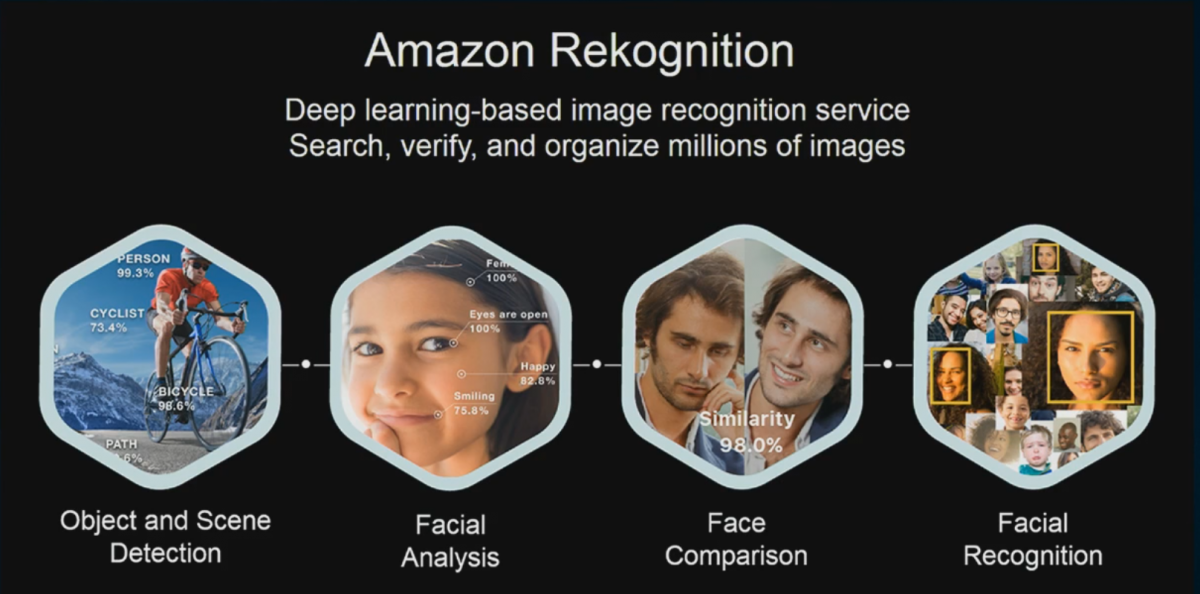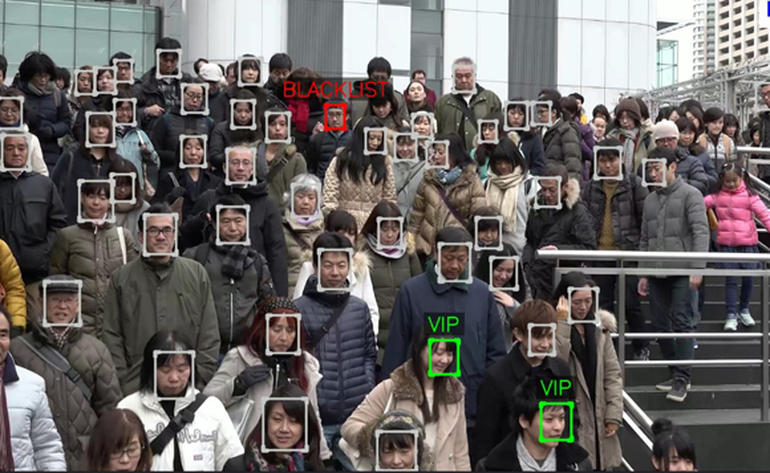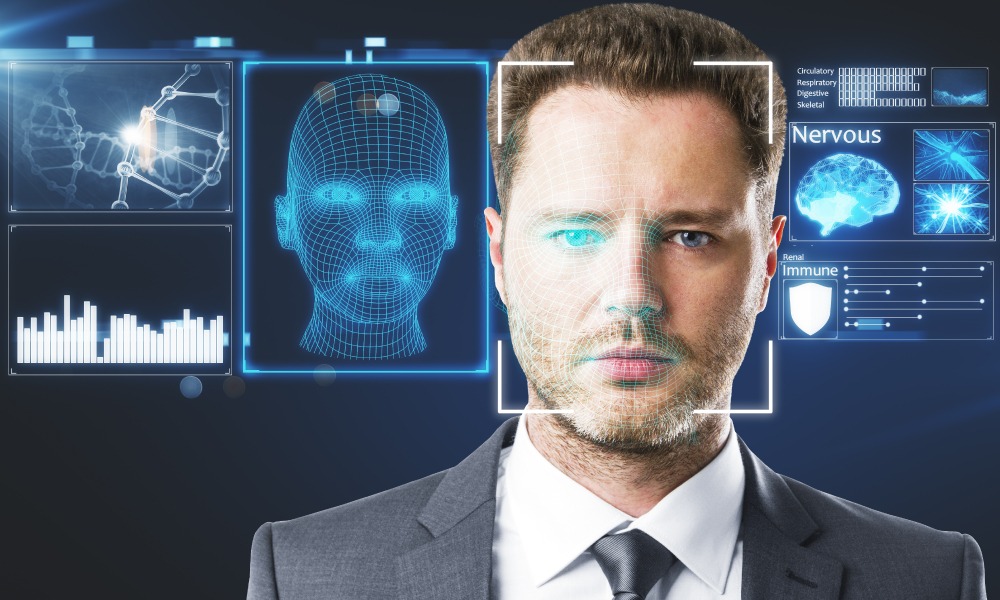
When most people hear Amazon, they think of an online store that features easy, one-click retail sales, convenient two-day shipping and millions of downloadable e-books. They picture a cute smiley logo.
However, this is only the small, visible part of Amazon’s iceberg of revenue and influence. In the underbelly beneath the surface lies the company's true operation: cloud data storage and the development of advanced surveillance tools for governments.
Amazon is actively working to sell a new type of facial recognition technology, known as Rekognition, to various branches of government and municipalities.
Rekognition has plenty of abilities and uses that are admittedly innocuous: the creation of searchable video and image libraries; user verification; detection of explicit content in images and videos; extraction of text from images, videos and banners; and identification of vehicles based on license plate numbers. It also recognizes popular celebrities.
Other uses are more disconcerting. Rekognition claims that it can detect emotions such as happy, sad or surprise. It also asserts that it can determine demographic information of a person, such as gender, from facial images alone. The software can analyze these images and send the emotional and demographic information to a section of Amazon Web Services, or AWS – its Internet hosting service.
Rekognition is also capable of recognizing faces in a crowd, and compares and stores them in a database container called “a face collection.”
“With Amazon Rekognition,” the website continues, “you can search images, stored videos, and streaming videos for faces that match those stored in a container known as a face collection. A face collection is an index of faces that you own and manage.”
The potential abuse of this software for surveillance and data harvesting purposes is so troubling that some of Amazon’s shareholders have pleaded with the company to forgo selling the facial recognition technology to the government.
Their letter of protest, however, was submitted too late. To date, Rekognition has already been sold to two local law enforcement agencies: the Washington County Sheriff’s Office, in Oregon, and the Orlando Police Department in Florida.
The technology is now in its second pilot in Orlando after its first attempt was canceled following resounding citizen opposition. According to documents obtained by Buzzfeed through a FOIA request, Amazon provided “tens of thousands of dollars of technology to [Orlando] at no cost,” and shielded the city with a “mutual nondisclosure agreement that kept details out of the public eye.”
Buzzfeed also learned that Amazon provided no hands-on training to the officers. Amazon declined to answer on-record if the system learns from the videos it takes in, if they provided hands-on training to officers, or how the system disregards faces that are not “persons of interest.”
Washington County, which has used Rekognition for about a year and a half, claims the technology is helpful in finding “persons of interest” through existing mugshots, and helping investigate Amber alerts. According to the sheriff’s office, state law doesn't permit the use of technology for mass or real-time surveillance.
However, the term “persons of interest,” used by both departments, is conveniently vague and nebulous enough that it may apply to just about anyone – even those without a reasonable suspicion of criminal activity. The stakes are incredibly high when officers entrust a nascent piece of technology to inform them to make instant, life-or-death decisions.
Additionally, Amazon is pitching its Rekognition software to U.S. Immigration and Customs Enforcement (ICE). Although it seems this could streamline the government's maintenance of records, there is also potential for significant errors and discrimination.
ICE already uses biometrics (fingerprints) in its documentation and cataloguing of undocumented immigrants. But the use of fingerprints has come under intense scrutiny for targeting undocumented immigrants for deportation. The misuse and lack of oversight has motivated a group of lawyers to sue ICE and submit FOIA requests to explain its oversight procedure. Facial recognition technology will likely continue this worrisome trend.
But Rekognition may not even help the police and ICE for the simple reason that it is inconsistent and inaccurate.
The ACLU ran a test in which it built a face database and search tool using 25,000 publicly available arrest photos. Then, the organization searched that database against public photos of every current member of the House and Senate. In its test, the ACLU found that Amazon’s Rekognition software incorrectly matched 28 members of Congress with mugshots of others who have been arrested for a crime.
About 40 percent of Rekognition’s false matches in this test were people of color. Of these members, six of the incorrect matches were individuals from the Congressional Black Caucus, including civil rights leader Rep. John Lewis – a celebrity the technology arguably should recognize.
Given the Trump administration’s dismal performance – failure in enforcing border security, managing undocumented immigrants’ families, and restraining ICE’s terrorization of communities of color – paired with the software’s proven potential for racial bias, the adoption of this technology is particularly concerning and should be grounds for rejection of its use outright.
Furthermore, the government is now testing the technology for use within the FBI, which would allow federal agents to sift through videos and images more quickly than ever before. It will also allow the FBI to build a system to automate the identification and tracking of any citizen. If the FBI adopts the nebulous term “persons of interest,” as our municipal police precincts have done, the nation's most powerful and pervasive law enforcement body would have free rein to target whomever it likes.
But Amazon’s surveillance rampage doesn’t stop there. Rekognition is coming to homes as well.
Amazon has submitted a patent to pair Rekognition and databases with a doorbell company called Ring, which, incidentally, Amazon bought earlier in 2018. With Ring and Rekognition combined, police can match the faces of people walking by the camera with a photo database of people that they deem “suspicious.” Homeowners can add photos of “suspicious” people and if a match occurs, the person’s face can be sent automatically to law enforcement.
Again, without legislative or judicial oversight, and without precedent, terms “suspicious” and “persons of interest” can quickly swell to include a large number of people who are not criminals.
The fact that Amazon is providing the surveillance software to catalog, document and match personal information, along with the cloud storage to store it all, is emblematic of an unsettling initiative where big business and big government work together to enact a pervasive surveillance state.
At the very least, Amazon’s spokespeople, federal government officials and local municipalities must be held accountable to provide fixed and honest answers about the real intentions of these devices. More importantly, they need to tell us how the government would specifically utilize these tools.
At the same time, citizens must ask how tools like Rekognition will benefit them – and demand assurances that they aren't simply being used to consolidate government and corporate power over our lives. Given the current political climate, and in respect of the Fourth Amendment, this technology shouldn't be allowed anywhere near our federal government in the first place.

















